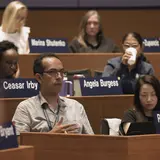
Gaining Insight into Business and Culture in Korea
Already familiar with Korean history and culture, Ellie Campion ’19 got a deeper understanding of the country's business climate during Global Network Week there.
This June, I journeyed to Seoul National University (SNU) in South Korea as part of Global Network Week (GNW). I leapt at the chance to learn about doing business in a country that has merged best management practices from East and West to fit its own unique needs. I was excited for a number of reasons. First, SNU’s reputation for academic rigor was common knowledge to me growing up Korean-American. GNW also happened to take place during a historic time: it was during our program that a sitting American president met with a North Korean leader for the first time to discuss denuclearization. Finally, on a personal level, I was looking forward to introducing my daughter to our Korean family and witnessing my parents’ first trip to Korea with their first grandchild.
I also wanted to learn more about the intricacies of working with chaebols (family-owned industrial conglomerates) in a recently developed country with demonstrated upward momentum. South Korea rose from the 18th-poorest country by nominal per capita GDP in 1961 to the 28th richest in 2018. While I knew that I would learn a great deal about this and other business-related issues, I wasn’t sure what I would learn about a people I thought I already knew so deeply—I speak Korean well and am familiar with Korean history and culture. SNU’s distinguished faculty and thoughtful program showed me a side of Korea I never saw. The professors interwove Korea’s cultural and economic history with HR policies and corporate governance in a way that helped foreigners not only understand the country’s current investment climate, but also why a strategy that works for one country doesn’t necessarily work for another. Our week also highlighted what Korean companies and the government have done well and what they need to do to become tomorrow’s innovative trailblazers.
In addition to what we learned in the classroom, the purpose of GNW was to make new friends, add a new lens through which we see the world, and have fun while doing it. We had the opportunity to see the old and new Korea, side by side. Along with fellow executives from around the world, I toured ancient palaces, outdoor markets, K-Pop idol generator FNC Entertainment, and global conglomerate Samsung. We made bibimbap together at Korea House and snapped blackmail-worthy photos of a classmate dancing on stage with traditional Korean dancers. The host students’ hospitality was hard to beat as we sampled delicacies along with karaoke bars in equal portion.
Nestled among two economic giants (China and Japan), Korea has to have a unique strategy to distinguish itself. I definitely walked away with a better understanding of Korea’s past, present, and its path forward. What I didn’t expect was to bridge a wide cultural and generational gap between my parents and myself that had been exacerbated by Korea’s meteoric economic growth—while adding a few new karaoke partners to boot. I look forward to witnessing how the dynamic country evolves to meet global and domestic demands in the years ahead.



